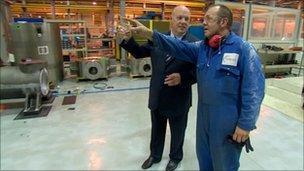Clyde Blowers boss says new tax power would help growth
- Published
Jim McColl, chairman and chief executive of Clyde Blowers, spoke to BBC Scotland about the effect of proposed changes to Scottish business tax
Handing corporation tax powers to Scotland would draw businesses away from an overheating London economy and encourage growth north of the border, a Scottish business leader has claimed.
Clyde Blowers boss Jim McColl said London was "already creaking at the seams with infrastructure".
And he argued lower business taxes could draw some companies to Scotland.
His comments followed Scottish government proposals for Holyrood to win control of corporation tax.
It has argued that cutting the headline rate would boost economic recovery.
Critics of the move said it could leave ministers short of money to pay for public services.
'Right answer'
But Mr McColl, who is chairman and chief executive of the engineering conglomerate Clyde Blowers, said it was necessary to "have faith in the politicians to do the right thing".
He continued: "They might not get there right away but eventually they are going to come to the right answer.
"I think the challenge we have in Scotland is that we are so far away from the centre of the UK, which is London, and you have to give businesses a reason to come to Scotland.
"They are not going to come here naturally - it is more costly to operate from Scotland.
"There are no direct routes to international capitals around the world - you have to go via London.
"When you have got customers coming over, they think twice about coming that extra leg, so you have to give people a reason to invest in Scotland."
Financial services
Mr McColl said there only needed to be a small movement of companies from within the UK to Scotland to make a big difference north of the border.
"If you take financial services for example - we have got a good financial service centre in Edinburgh.
"You could see some people moving from London to Edinburgh, which would strengthen our financial services side."
He continued: "I don't think there is any need in London to attract new businesses - it is already creaking at the seams with infrastructure.
"But I think we need the additional levers in Scotland to improve the economy and the growth in the economy.
"What you are looking for is an increase in the absolute amount of tax you take.
"That's quite different from increasing tax rates and maybe that's not grasped by everyone.
"But I think there's enough evidence around to show that you can reduce tax rates and increase your tax take."
Public spending
Mr McColl also dismissed recent reports by the Institute of Chartered Accountants of Scotland and PwC which claimed handing powers to set corporation tax from Westminster to Holyrood could destabilise public spending.
He commented: "I read the accountants' reports on what would happen and I can tell you in the past few years we have added over 300 people here in this company.

Mr McColl's portfolio of companies includes Clyde Union in Glasgow
"My accountants would tell me that is a high cost and there is no guarantee that I will get additional business for it.
"But I make the judgment to do it because I do believe that we are going to get a benefit from it - and we have got a benefit from it.
"So, the last person you want to talk to about advising you about what to do in your business is an accountant."
In a wide-ranging interview, Mr McColl - who is one of Scotland's richest men - also hit out at critics who have described him as a tax exile over his decision to base himself in Monaco.
The Clyde Blowers chief, whose personal worth has been estimated by the Sunday Times Rich List at £570m, said: "For a start I think 'tax exile' is an emotive phrase - I don't think it is a fair phrase to use.
"I choose to live somewhere where I like to live. It is sunny, has nice restaurants, it is very safe and it is a nice lifestyle. I can afford to live there so I choose to live there.
"But I would say about most of the people who criticise this - I probably contribute more to the economic benefit of the UK and Scotland in a year than they do in a lifetime."
He added: "So, I am very focused on investing in Scotland and passionate about Scotland."
You can hear more of the interview on BBC Radio Scotland's Business Scotland at 10:05 BST on Sunday, and later by free download.
- Published16 August 2011
- Published10 December 2010